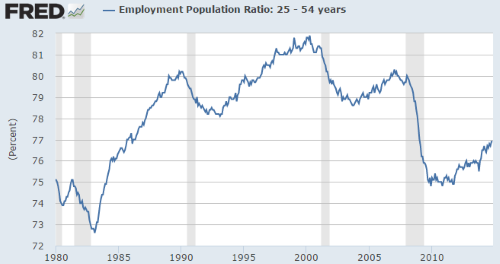How're we doing? (A review of 2014)

Overview: Like last year, 2014 gave us a s lowly improving economy, and a rocketing stock market ! Since the 2007-08 downturn, most measures of the economy have stabilized and have started to improve from their bottom. Even total-employment got back, though the more important number (Employment-to-population) is still low. The broadest GDP measure has been increasing very slowly. House-prices came well off their bottom, someway half-way to the old peak, but have recently flattened for a few months. Meanwhile, the stock market is at an all-time high. Corporate profits are high since GDP is growing slowly while firms have kept a reign on costs. Companies have kept buying back stock at above-average levels. This is different from the type of excitement that drove the dot.com boom, because it does not cascade into higher salaries and expenditures: quite the opposite. In the short/medium term, this is "blah" for employment numbers and wages. Here are some of the detail...


